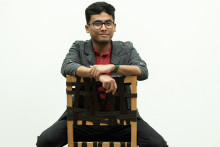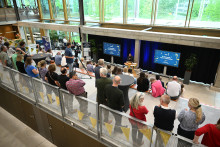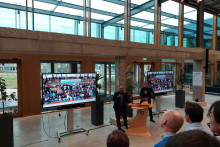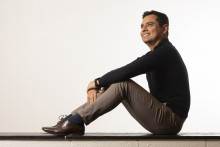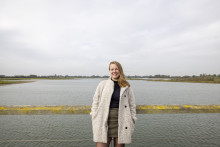‘Since high school, I wanted to be in academia and climb the academic ladder – postdoc, assistant professor and ultimately to become a full professor. To stay in academia, you of course need a PhD degree, and so I didn’t consider anything else after my Master’s. But to be honest, right now I’m contemplating working outside of academia. At a university, you focus on this very niche topic, you go into extreme details, but outside you have more opportunities to apply your knowledge – and use it to help people in the real world.
I’m only in the second year of my PhD research, and I don’t know where the road will lead, but I think I’d like to spice up my experiences, so to speak. Essentially, I have been doing the same thing since childhood. I have been reading, writing, and taking exams. Largely, that it the same when doing a PhD.’
Udipta Boro
PhD research topic: Cities under the artificial intelligence (AI) gaze: exploring the making of automated urban video surveillance systems in gendered urban spaces
Work: PhD candidate at the Department of Urban and Regional Planning and Geo-Information Management, at the Faculty of Geo-Information Science and Earth Observation, University of Twente
Education: Master’s degree in Urban Planning and Management, University of Twente
Originally from: Assam, India
‘Broadly speaking, my PhD research looks into the interaction between technology and society. My goal is to explore what human values go into making technological systems, and what power dynamics play a role in designing and implementing these systems.
More specifically, I focus on CCTV (closed-circuit television, ed.) surveillance systems in India. I’m investigating a Safe City project which aims to make Indian cities safer for women by using video surveillance. The idea of this project is that the more cameras there are on the streets, the safer women will be. The project also uses artificial intelligence to detect incidents in real time. If a woman makes an SOS gesture to the camera or if a lot of men are detected surrounding a woman, the system should alert authorities and send help. Their goal is also to predict future incidents based on collected data, identifying which areas are more prone to crime, for example.
'There is no direct correlation between crime and the number of CCTV cameras'
I’m looking into how these systems are designed, what values are defined, who decides – before the systems are implemented. If we know what happens in this pre-implementation phase, we might be able to develop better systems for society. The idea of using technology to solve societal problems has been controversial, and so I wanted to see what the process actually looked like, and hopefully contribute to socially better technology.’

‘It's important to consider this because of the impact these surveillance technologies might have on people. One of the main arguments for using more CCTV cameras is that it will reduce crime. However, research has shown that this doesn’t happen. There is no direct correlation between crime and the number of CCTV cameras. Moreover, CCTV can be used for unintended purposes.
A recent example is the morality policy in Iran which seems to be using video surveillance to enforce morality laws, such as women wearing hijabs. As another example, some marginalized communities might become hyper visible due to CCTV. In India – and other parts of the world – marginalized groups are often portrayed as untrustworthy and troublesome, as the ones more prone to committing crimes. This is when the power aspect comes into play because these communities cannot decide who is monitored and when.’
'Doing a PhD has taught me that I’m stronger than I think I am'
‘If I could give my younger self a piece of advice, I’d say: it’s better to focus on your goals and envision your life in the future. Live as if you’re being pulled by the future, not being held back by the past or the present.
Doing a PhD has taught me that I’m stronger than I think I am. I’ve had this realization at every stage so far. Already when I was applying for the PhD position, I was certain that I was not capable of getting it. There were about two hundred candidates for the position, but I was selected in the end, which made me very happy. When I was meeting my colleagues for the first time, I thought I’d feel like an outcast among the experienced and smart group of people, but I was welcomed. When I had to write the qualifier during my first year of PhD, I thought I could never do it. But I did it at a first try. During my recent field work in India, there were moments I felt like it was all leading nowhere, but I managed to find a workaround and move forward. I can do better than I think I can, and I need to keep reminding myself of that.’



